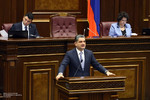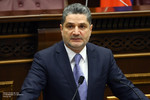Thursday, 15 November 2012
PM Addresses National Assembly
Dear Chairpersons,
Dear Members of Parliament,
I wish to note that the National Assembly budget debate started with the Prime Minister’s statement. I had the honor to outline the ideological principles upon which to build the draft State budget law. Now I wish to thank you for interest and helpful discussions.
The task number one is the following: we must keep our people and the State safe of turmoil and external risks in 2013. This is a serious problem, taking into account the challenges, risks and threats that are currently available in the world and the region. This makes us submit a well-balanced and realistic budget and refrain from those unnecessary social risks and pitfalls which destabilized dozens of economies around the world since they had assumed unrealistic social commitments.
It might be tempting to submit before the forthcoming presidential elections such a budget bill as would provide for a sharp increase in wages, social benefits and pensions. But we refrained from this temptation, because we feel highly responsible for the situation in the country and our most important task is to safeguard our country from unnecessary threats.
While there is just resentment available in society, we have never claimed the right to present you the absolute truth, standing ready for a dialog on this very basis.
We are grateful to those MPs who came up with about 60 proposals on how to improve the budget bill. Some of them will be accepted indeed. We are open for a dialog.
The draft budget law provides a framework for radical transformations in 2013. It is the chief mission of the bill. We are far from assuming risky obligations. Nevertheless, we are committed to the implementing major reforms.
It is on this very basis that I have been trying to find out a rationale behind the opposition’s criticism that can help us improve the State budget bill to implement economic reforms. I am convinced that most of our critics are fair in their intentions and seek to build a more prosperous country. We are grateful for criticism.
I will focus on those tasks that can form the basis for a dialog. The first focus is to ensure economic growth. Our task is to achieve economic growth and pursue a per-sector industrial policy. We have always been open to dialog. I mean that either the opposition has appreciated our program of per-sector industrial policy, which seeks to increase exports. I want to thank you for participating in these discussions.
Secondly, we appreciate the idea that we need to present to the public a new comprehensive program of sustainable development and invite you to discuss the document, which will show all the figures up to 2025.The recommendations submitted may be helpful in this regard. Major improvements can already be stated in this area: we have shifted from the concept of macroeconomic stability to a concept, which provides that the government should be responsible for the conduct of per-sector industrial policies.
Coming to the countryside and our agricultural policy, I should state that drastic changes were made over the last three years, and they will be continued. We have developed a comprehensive program. From now on, we will consider village and agriculture as an integral issue, because agricultural reform implies productivity growth. In this respect, we are facing a serious problem, namely to provide people with jobs in rural areas. From this point of view, the program of balanced development of the regions remains essential to us.
Dear colleagues, the criticism of our welfare policy has been calling for increased social benefits, pensions and indexation. Our critics forget that we have submitted a program of fundamental changes. I feel that this issue is overlooked as they concur in our policy. We are not going to fight against consequences. Instead, we will deal with the causes behind poverty and welfare problems. We are in for a fundamental change in this area: targeted assistance for needy households, employment, more spending on education and healthcare for poor families. This means that the distribution of funds is in tune with this new model.
The next problem is over-centralization, the deepening of the difference between the rich and poor. This problem has been reflected in our election program and in the program submitted to the National Assembly for approval. I think that we can work with you in terms of making as many offers that sound from our critics, worthy of discussion, and we see that we can find mutually acceptable solutions in this area.
Down to the fight against corruption, I would like to thank the ARF Dashnaktsutyun and Heritage factions for attending the meeting which was held at the Office of Government. I wish to inform you that your proposals are acceptable to us. We will concentrate on 2-3 priorities and agree with you in that the monitoring committee should comprise opposition representatives. I am officially informing you that the proposal of ARF Dashnaktsutyun has already been accepted.
The committee will be constituted as follows: 1/3 - opposition, 1/3 – oppositional-minded NGOs and 1/3 – the Government. I am confident that this proposal will help us further improve the anti-corruption program.
Another key problem is the funding of science. While we agree with the criticism voiced, we unfortunately have to admit that the State still is unable to allocate the necessary funding for science. We are ready to discuss with you this question in the sense that we were able to understand if effectively the money that we allocate, give a positive result, and if so, we add the funding dedicated to science.
Dear colleagues, our work style is as follows: we are well aware that the opposition should criticize the government, while we must resist the temptation to reply with the same energy and urgency. Our problem is elsewhere, namely to identify the common grounds so that an atmosphere of solidarity and cooperation is formed: our primary task is to bring about cooperation, while the opposition should criticize us.
Dear colleagues, I want to assure you once again that we will study very carefully all the comments and suggestions you are going submit within the next 24 hours as required by law. Be sure that we will try to take into account all the recommendations that are compatible with our ideological principles.
Thank you.









